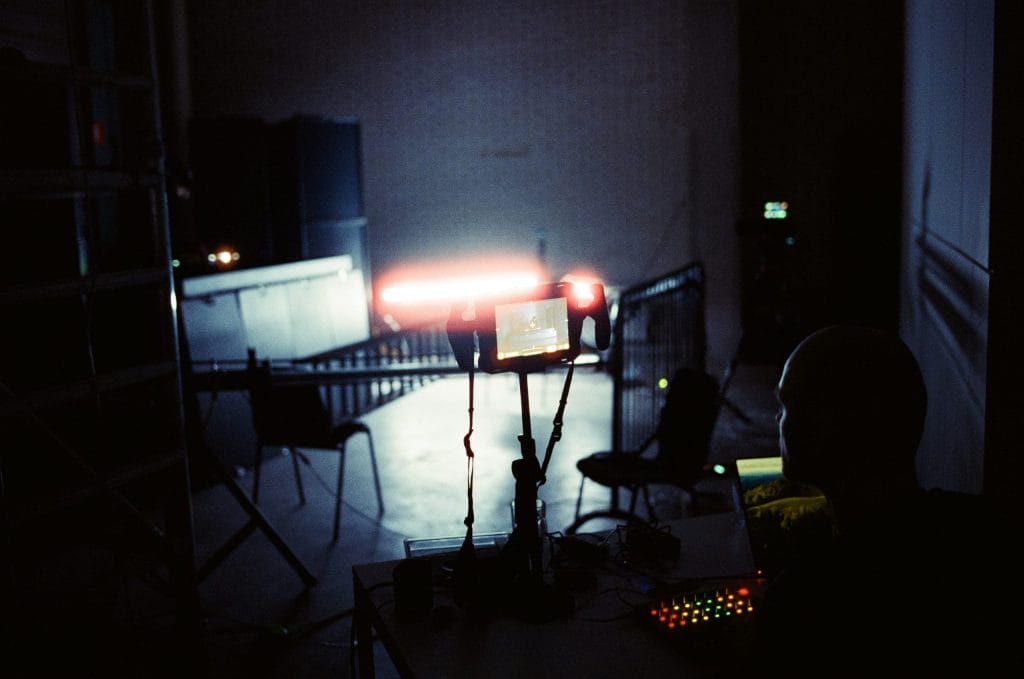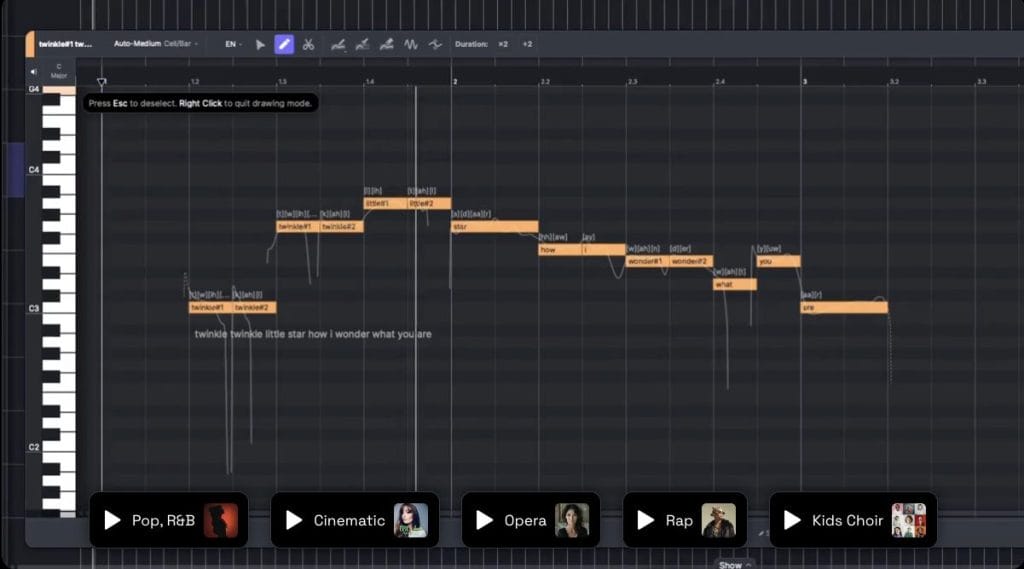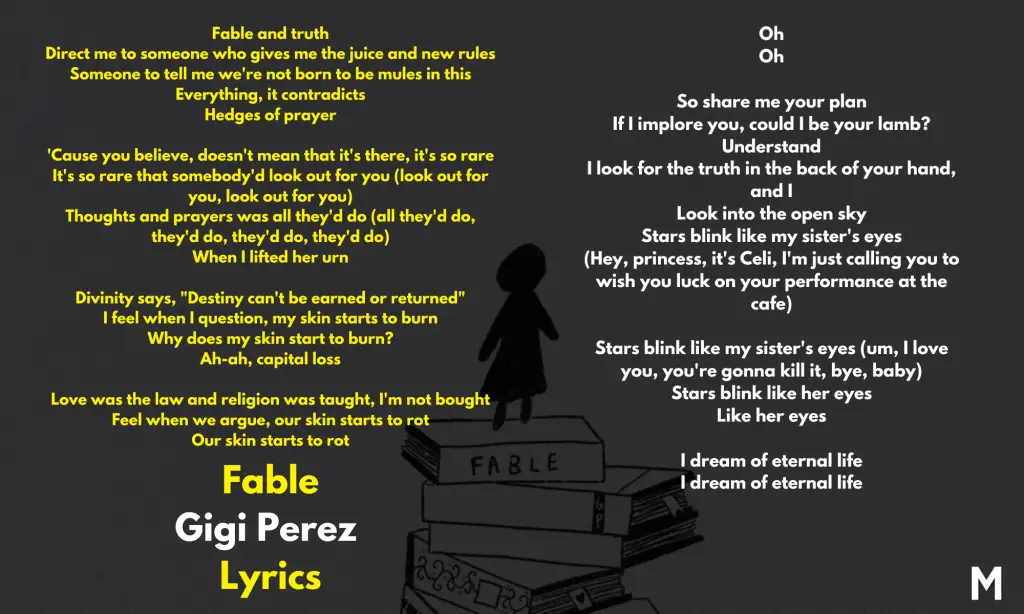Table of Contents
Image Cred: Island Records & Gigi Perez
Gigi Perez’s “Fable” is the kind of song that lingers with you long after it’s over—not just for its deeply personal roots, but for the universal questions it raises. Inspired by the last song her late sister performed, it navigates themes of faith, grief, love, and the afterlife. The lyrics are packed with haunting lines like “thoughts and prayers was all they’d do” and “stars blink like my sister’s eyes.” Each line feels like an invitation to sit with the heaviness of loss while searching for something greater.
As someone who loves digging into literature and creative writing, I see “Fable” as a poetic exploration of human emotions. The lyrics hit on a level that makes you want to pause and ask: What’s really being said here? How do these words connect to bigger ideas about belief, memory, and meaning?
What’s fascinating about “Fable” is how it mirrors the kinds of themes we see in classic poetry or even modern fiction. It blends personal grief with universal truths, tackling questions we’ve seen writers wrestle with for centuries. These connections aren’t about proving anything definitive; they’re about deepening our understanding of the song’s timelessness. With that in mind, let’s break it down and see what “Fable” has to teach us.
“Fable” by Gigi Perez at a Glance
- It’s a deeply personal exploration of grief and faith. Inspired by the loss of her sister, the song reflects on belief systems, love, and the search for meaning in pain.
- The lyrics balance universal themes with intimate moments. From questioning religious platitudes to tender memories of her sister, Perez combines existential questions with personal storytelling.
- The imagery is raw and unforgettable. Lines like “skin starts to burn” and “stars blink like my sister’s eyes” create vivid visuals that stick with you, capturing the weight of grief and wonder.
Fable Gigi Perez lyrics
Fable Gigi Perez Meaning
“Fable and truth / Direct me to someone who gives me the juice and new rules”
These opening lyrics set the stage for the speaker’s journey. Right away, they point out a divide between comforting stories (“fable”) and harder realities (“truth”). The request for “juice and new rules” shows a need for something fresh and meaningful. To me, it’s clear the speaker wants to break free from outdated ideas that don’t work for them anymore.
This idea of challenging traditional beliefs connects strongly to Thomas Hardy’s poem “Hap.” Hardy struggles with the randomness of life, saying, “If but some vengeful god would call to me…” He imagines that even cruel divine control would be better than the indifference he feels in the world. Both Hardy (and no, it’s not Tom Hardy for anyone who got excited) and the speaker in this song want clarity—they’re searching for something solid they can hold onto.
The next line—“Someone to tell me we’re not born to be mules in this / Everything, it contradicts”—really drives the frustration home. The word “mules” paints a picture of people as overworked and undervalued, stuck in roles they didn’t choose. The contradictions they see in life and faith only make things worse. Like Hardy’s poem, these lyrics express a longing for answers in a world that doesn’t always make sense.
“Thoughts and prayers was all they’d do / When I lifted her urn”
This lyric is one of the song’s most heartbreaking moments. The image of “lifting her urn” makes the grief feel so real and raw. At the same time, the speaker is disappointed with the empty gestures of “thoughts and prayers.” These words often feel hollow when they’re not backed up with real care or action.
Anne Sexton’s “The Truth the Dead Know” reflects this kind of frustration. After losing her parents, Sexton writes, “It was not true, it was just a gesture.” Like the speaker in the song, she finds no comfort in rituals or religious phrases. The act of facing death—whether lifting an urn or attending a funeral—feels like something you go through alone, no matter what people say to you.
This lyric also makes me think about how society handles grief. The speaker seems to want more than superficial sympathy. They’re grappling with the finality of death, symbolized by the urn, and realizing how little traditional responses help when you’re dealing with such a deep loss.
“I feel when I question, my skin starts to burn”
This line speaks to the physical toll of doubt. The “burning skin” feels like a metaphor for guilt or fear—a reaction to challenging long-held beliefs. It shows how hard it is to question something that’s been part of you for so long.
Later, the song introduces another striking image: “Feel when we argue, our skin starts to rot.” This adds a new layer to the metaphor, connecting the decay to relationships. It suggests that arguments and disconnection can eat away at who we are. These lines, taken together, show how deeply emotional and existential struggles can affect both the body and the mind.
A.R. Ammons captures a similar feeling in “Corsons Inlet.” He writes, “I see that the waves have the force / to shape and destroy.” While Ammons finds beauty in nature’s chaos, the song’s speaker focuses on its destructiveness. Both, however, acknowledge that struggle and conflict are part of life, whether in relationships or within ourselves.
“Stars blink like my sister’s eyes”
This lyric is one of the most touching in the entire song. The speaker connects the vastness of the cosmos—the blinking stars—to something deeply personal: their sister’s eyes. It’s a beautiful way of showing how we find meaning in relationships, even when faced with the infinite.
This moment reminded me of A.R. Ammons again. In “Corsons Inlet,” he writes about the endless patterns and movements of nature, saying, “The order of things arises from the sweep of the infinite.” Both Ammons and the song’s speaker find a kind of grounding in the connection between the personal and the cosmic. For the speaker, the memory of their sister gives them a way to anchor themselves in a universe that can feel overwhelming.
By repeating “stars blink like her eyes,” the song makes it clear how central this memory is. It’s not just a fleeting thought; it’s a lasting connection that helps the speaker navigate their grief and questions about life’s meaning.
“I dream of eternal life”
This closing line sums up the speaker’s deepest longing. They’re not just talking about literal immortality. To me, it feels like they’re searching for something permanent—whether it’s love, truth, or a sense of purpose that lasts beyond the struggles of life.
Thomas Hardy’s “Hap” ties into this idea of yearning for something greater. Hardy writes, “Crass Casualty obstructs the sun and rain, / And dicing Time for gladness casts a moan.” Hardy sees life as ruled by randomness, which makes the search for meaning even more urgent. The speaker in the song might not have all the answers, but their dream of eternal life shows that the search itself is meaningful to them.
This ending feels hopeful, even if it’s uncertain. The speaker has questioned faith, faced grief, and found moments of connection along the way. Their dream of eternity isn’t just about escaping death—it’s about finding something worth holding onto, even in the face of doubt and loss.
Connecting The Dots Here
Gigi Perez’s “Fable” is a song about the collision of faith, doubt, and grief. Inspired by the loss of her sister, Celene, Perez uses personal imagery—like lifting her sister’s urn—to grapple with universal questions about belief and meaning. Her lyrics don’t settle on easy answers, which makes them feel even more relatable. Instead, she leans into the discomfort of questioning what we’ve been taught to believe about life, death, and the afterlife.
Take the opening lines: “Fable and truth / Direct me to someone who gives me the juice and new rules.” These words set the tone for the song, as the speaker seeks guidance but feels let down by old narratives. The idea of needing “new rules” echoes the frustration of wanting something fresh and authentic when traditional beliefs fall short.
This tension also shows up in Thomas Hardy’s poem “Hap,” where Hardy wishes for a divine plan, even a cruel one, just to give suffering a purpose. Both Hardy and Perez seem to share this longing for clarity, but neither settles for blind faith.
The personal nature of “Fable” comes through most strongly in lines like “Thoughts and prayers was all they’d do / When I lifted her urn.” Perez critiques the hollowness of platitudes in the face of profound loss. This ties directly to her sister’s death, which Perez has said inspired the song’s title and themes. It reminds me of Anne Sexton’s “The Truth the Dead Know,” where Sexton writes about rejecting empty rituals after the death of her parents. Sexton says, “I am tired of being brave,” and you can feel a similar exhaustion in Perez’s lyrics—a weariness with shallow gestures that don’t address the reality of grief.
Then there’s the cosmic imagery: “Stars blink like my sister’s eyes.” This line beautifully ties the personal to the universal. By comparing her sister’s memory to the stars, Perez suggests that love and connection can transcend the limits of mortality.
It’s a way of finding hope in something bigger, even while grappling with doubt. A.R. Ammons captures a similar feeling in “Corsons Inlet” when he writes about finding beauty in nature’s contradictions. Ammons’s work reminds us that life’s messiness can still be meaningful, a sentiment Perez seems to echo with her starry-eyed connection to her sister.
The post Fable Gigi Perez Lyrics and Meaning: Understanding the Layers of Faith and Doubt appeared first on Magnetic Magazine.






